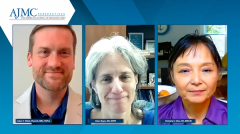
Long-Term Impact of Childhood RSV
Long-term effects of pediatric RSV diagnosis are explored.
Episodes in this series

Adam C. Welch, PharmD, MBA, FAPhA: Talk to me now, [Debra Boyer, MD, MHPE], about some of the long-term consequences of RSV. So you mentioned that it’s very, very common in infants, but maybe over the first 3 years of their life, what are we looking at as far as long-term consequences?
Debra Boyer, MD, MHPE: So, it’s actually a really interesting discussion. And I think the short answer is it’s not actually clear. So, there is a suggestion that children who get RSV have a higher likelihood of developing asthma as they get older. But when you don’t and when you dig deeper into the literature, it’s very interesting because it almost is: What comes first, right? Are these children getting RSV and getting sicker because they’re a top egg and they have a disposition to develop asthma when they’re older, and that’s why they’re getting RSV that’s more significant? Or is it the other way around, that they get RSV and that triggers the immune system in a way that causes them to develop asthma. So…I can find articles that argue both points and articles that say that it’s not clear…. There’s one interesting article that even talks about—this is a meta-analysis—that shows a higher association of asthma with rhinovirus as opposed to RSV. So the short answer is it’s not clear. It’s more likely if you have severe lung disease, lower airway lung disease, that you’ll have asthma when you’re older. But it’s not clear whether that’s from the RSV causing it or whether, again, we’re just more susceptible, more atopic, more likely to have asthma. So, I think that’s the biggest long-term outcome that we look for…assuming you get through your illness without any other significant and immediate effects.
Adam C. Welch, PharmD, MBA, FAPhA: Sure. And when you talk about RSV, you also mentioned that people can get infected multiple times. So it sounds like the natural immunity that your body builds from one infection may not persist very long or it’s not very long lasting.
Debra Boyer, MD, MHPE: I think, again, I don’t know [how clear] that is and how much people understand about that. I think it is clear that children and adults, for that matter—but children [are] clearly get reinfected with RSV. And so having one strain does not mean that you’re going to not get another strain that is circulating around. So…that’s one…discussion about whether you give prophylaxis to children who have already had RSV. But again, that adds to the cost. And so I think generally that’s not recommended, but I think it’s still an evolving topic at this point.
Transcript edited for clarity.
Newsletter
Stay ahead of policy, cost, and value—subscribe to AJMC for expert insights at the intersection of clinical care and health economics.










